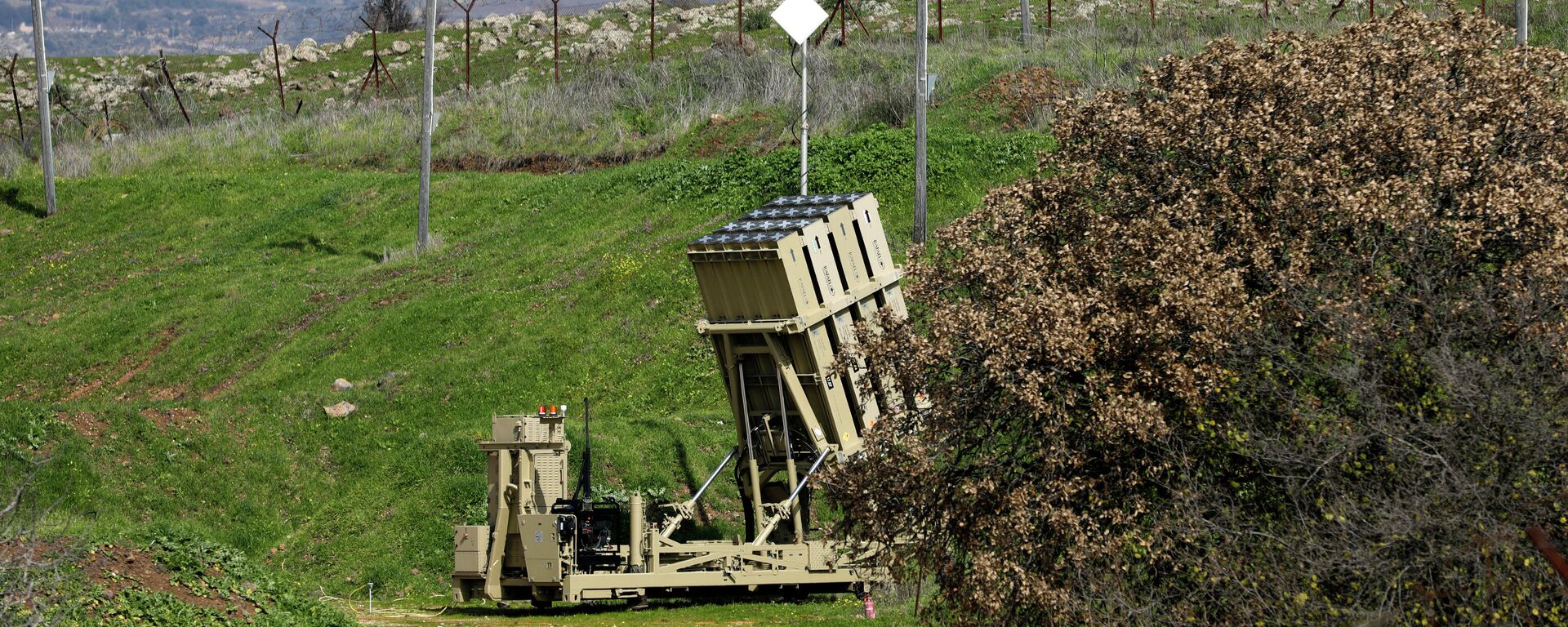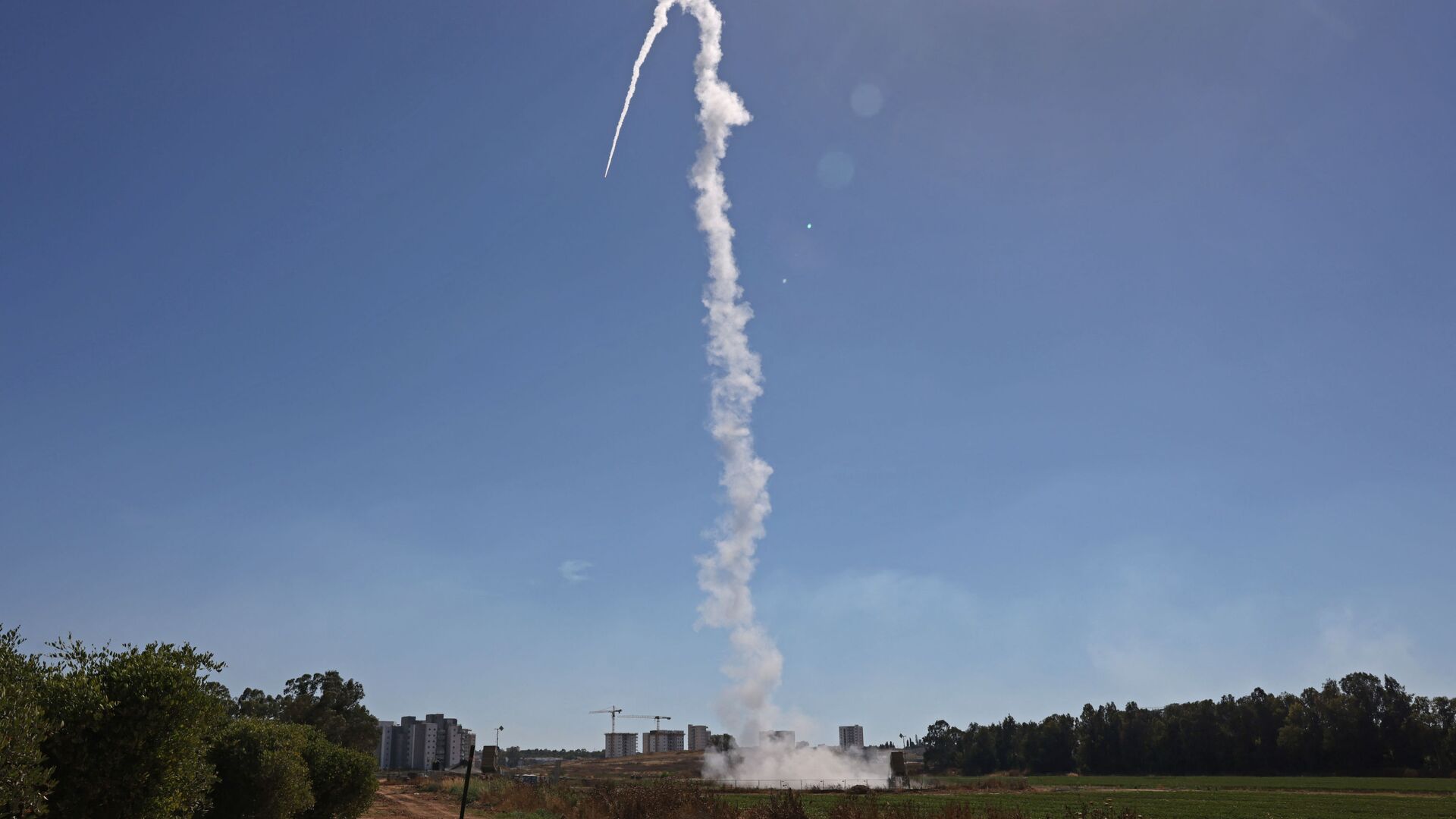https://sputnikglobe.com/20220626/hamas-has-taken-pause-to-prepare-for-new-attacks-against-israel-kfar-gaza-resident-believes-1096665895.html
Hamas Has Taken Pause to Prepare for New Attacks Against Israel, Kfar Aza Resident Believes
Hamas Has Taken Pause to Prepare for New Attacks Against Israel, Kfar Aza Resident Believes
Sputnik International
Israel’s Prime Minister Naftali Bennett has taken credit for bringing calm to southern Israel which is occasionally targeted in missile attacks launched from... 26.06.2022, Sputnik International
2022-06-26T10:41+0000
2022-06-26T10:41+0000
2023-12-05T09:22+0000
israel
gaza strip
https://cdn1.img.sputnikglobe.com/img/07e5/08/06/1083541398_0:161:3071:1888_1920x0_80_0_0_73e39d478d414776d2a6374fe3306fdb.jpg
As of the beginning of June, he said that only six rockets from Gaza were fired at Israel in 2022 as opposed to 3,520 in 2021. However, locals do not seem to believe the trend will continue.Or Bar-Ilan, a resident of Kfar Aza, a small Israeli community only 1.4km to the east of the border with the Gaza Strip, says local residents have no illusions about the situation, despite the dramatic decrease in the number of attacks over the past 12 months."This quiet is only a stopgap while Hamas gets more ammunition. Everyone who lives here knows it. We have seen this trend for more than 20 years".The first rockets from Gaza were launched in 2001 but their scope started to grow after 2007, when Hamas – deemed a terrorist organization by Israel - took control of the Strip.According to estimates, since then thousands of rockets have been fired at Israel. Dozens of lives have been lost. Thousands have been injured. Significant damage has been caused to Israel's infrastructure.At the height of the conflict, Israel launched four campaigns against Hamas militants and their allies. These operations dealt a blow to their infrastructure and killed thousands. But experts believe they failed to shatter the group's military capabilities which have only got stronger.Israeli military estimates suggest that Hamas and other terror groups have more than 18,000 rockets, even after 4,000 were destroyed during the recent round of hostilities last May.Prime Minister Bennett claimed in June that during his tenure peace had been brought to the residents of Gaza-border communities.But Bar-Ilan feels this is merely the calm before the storm and says it is only a matter of time until they "land on our heads".Diplomatic Solution NeededThe Bennett government was not able to offer that. Comprising eight parties with quite opposing ideologies and relying on Raam - an Islamic faction with purported ties to the Muslim Brotherhood - the coalition has failed to tackle issues pertaining to the Israeli-Palestinian conflict.It offered certain concessions to Gazans, including more work permits and the expansion of the fishing zone, but a political solution for the enclave is still a long way off. And any government of Yair Lapid, who is expected to take office later this week, is unlikely to fare any better."No matter who is in power, we constantly hear about the need to protect the Gaza-border communities. But ultimately nothing is done," reasoned Bar-Ilan."For change to happen, Israel needs to start talking to those Hamas terrorist. F-16 jets will not improve conditions in Gaza. But negotiations will and this might lead to the long-awaited diplomatic solution. This is needed not only by us but also by the Gazans, who are living in dire economic conditions," she added.The Gaza Strip has been mired in economic hardship for years but the situation worsened after the Hamas coup in 2007 and the subsequent Israeli blockade of the Strip.Today, Gaza's unemployment has already exceeded 50 percent and poverty rates are nearing 60 percent.
https://sputnikglobe.com/20220221/israeli-army-successfully-tests-naval-version-of-iron-dome-missile-defence-system-1093241855.html
israel
gaza strip
Sputnik International
feedback@sputniknews.com
+74956456601
MIA „Rosiya Segodnya“
2022
News
en_EN
Sputnik International
feedback@sputniknews.com
+74956456601
MIA „Rosiya Segodnya“
Sputnik International
feedback@sputniknews.com
+74956456601
MIA „Rosiya Segodnya“
israel, gaza strip
Hamas Has Taken Pause to Prepare for New Attacks Against Israel, Kfar Aza Resident Believes
10:41 GMT 26.06.2022 (Updated: 09:22 GMT 05.12.2023) Israel’s Prime Minister Naftali Bennett has taken credit for bringing calm to southern Israel which is occasionally targeted in missile attacks launched from the neighboring Gaza Strip.
As of the beginning of June, he said that only six rockets from Gaza were fired at Israel in 2022 as opposed to 3,520 in 2021. However, locals do not seem to believe the trend will continue.
Or Bar-Ilan, a resident of Kfar Aza, a small Israeli community only 1.4km to the east of the border with the Gaza Strip, says local residents have no illusions about the situation, despite the dramatic decrease in the number of attacks over the past 12 months.
"This quiet is only a stopgap while Hamas gets more ammunition. Everyone who lives here knows it. We have seen this trend for more than 20 years".
The first rockets from Gaza were launched in 2001 but their scope started to grow after 2007, when Hamas – deemed a terrorist organization by Israel - took control of the Strip.
According to estimates, since then thousands of rockets have been fired at Israel. Dozens of lives have been lost. Thousands have been injured. Significant damage has been caused to Israel's
infrastructure.
At the height of the conflict, Israel launched four campaigns against Hamas militants and their allies. These operations dealt a blow to their infrastructure and killed thousands. But experts believe they failed to shatter the group's military capabilities which have
only got stronger.
Israeli military estimates suggest that Hamas and other terror groups have more than 18,000 rockets, even after 4,000 were destroyed during the recent round of hostilities last May.
Prime Minister Bennett claimed in June that during his tenure peace had been brought to the residents of Gaza-border communities.
"In 2019, 1,291 rockets were fired from Gaza into Israel; in 2020, 176. In 2021, 3,520. And in 2022, only six rockets: without killing or injuring anyone," he said in the beginning of June.
But Bar-Ilan feels this is merely the calm before the storm and says it is only a matter of time until they "
land on our heads".
"We know that this ceasefire will be followed by louder explosions in the future. And it will continue for as long as diplomatic solutions have not been reached".

21 February 2022, 16:12 GMT
Diplomatic Solution Needed
The Bennett government was not able to offer that. Comprising eight parties with quite opposing ideologies and relying on Raam - an Islamic faction with purported ties to the Muslim Brotherhood - the coalition has failed to tackle issues pertaining to the Israeli-Palestinian conflict.
It offered certain concessions to Gazans, including more work permits and the expansion of the fishing zone, but a political solution for the enclave is still a long way off. And any government of Yair Lapid, who is expected to take office later this week, is unlikely to fare any better.
"No matter who is in power, we constantly hear about the need to protect the Gaza-border communities. But ultimately nothing is done," reasoned Bar-Ilan.
"For change to happen, Israel needs to start talking to those Hamas terrorist. F-16 jets will not improve conditions in Gaza. But negotiations will and this might lead to the long-awaited diplomatic solution. This is needed not only by us but also by the Gazans, who are living in dire economic conditions," she added.
The Gaza Strip has been mired in economic hardship for years but the situation worsened after the Hamas coup in 2007 and the subsequent Israeli blockade of the Strip.
Today, Gaza's unemployment has already exceeded 50 percent and
poverty rates are
nearing 60 percent.




